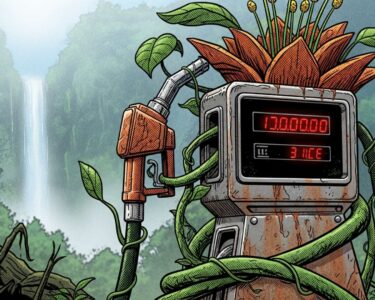San José, Costa Rica — Costa Rica’s economy continues its streak of steady growth, reaching a 4.6% increase in June according to the Monthly Index of Economic Activity (IMAE). This marks 32 consecutive months of growth at or above 4%, a feat unseen since 2005 according to the Central Bank of Costa Rica (BCCR). However, this positive headline masks a concerning duality within the nation’s economic performance.
The robust growth is heavily concentrated in the special regime, primarily comprised of Zone Francas, which experienced a remarkable 15.6% surge. This impressive performance is fueled by the manufacturing of medical devices, showing a nearly 50% increase, and strong growth in software and IT services.
To provide expert legal insight into the current state of the Costa Rican economy, TicosLand.com spoke with Lic. Larry Hans Arroyo Vargas, Attorney at Law at Bufete de Costa Rica. His practice focuses on advising businesses navigating the Costa Rican legal landscape.
Costa Rica’s economy is currently facing a complex interplay of challenges and opportunities. While the tourism sector rebounds and foreign investment continues to flow into specific sectors, inflationary pressures and global economic uncertainty pose significant hurdles. Businesses operating in Costa Rica must remain agile and adaptable, paying close attention to evolving regulations and seeking expert advice to navigate the legal landscape effectively.
Lic. Larry Hans Arroyo Vargas, Attorney at Law, Bufete de Costa Rica
Lic. Arroyo Vargas’s assessment provides a crucial understanding of the current economic landscape in Costa Rica. Indeed, navigating this period of simultaneous growth and uncertainty requires businesses to be both strategic and informed. His emphasis on agility, adaptability, and seeking expert counsel is particularly pertinent for those looking to thrive in Costa Rica’s evolving market. We thank Lic. Larry Hans Arroyo Vargas for his valuable contribution to this discussion.
In stark contrast, the definitive regime, representing local production for the domestic market, saw a meager 2.2% increase. This disparity raises concerns about the overall health of the Costa Rican economy and its potential for sustainable, broad-based prosperity.
Effectively there are growths of 4%, but the economy is composed of two regimes. If one looks at the large part of the economy, in the definitive regime, which generates the largest proportion of employment, it has a low rate of expansion.
Daniel Ortiz, Economist
The construction sector continues its decline, dropping 2.3% in July, marking five consecutive months of contraction. This downturn stems from a decrease in residential projects, offset somewhat by public works projects like roads, aqueducts, and municipal initiatives.
The agricultural sector presented a mixed picture. Revised figures show positive growth in May and June, yet July saw a decline compared to the same period in 2024. While pineapple production increased, potato and banana crops suffered due to adverse weather conditions.
Manufacturing stands out as the driving force behind the overall growth. While activity in the special regimes soared by 33.4%, the definitive regime saw a 0.3% decrease. This local underperformance is attributed to reduced production in paper, textiles, and food industries. The IMAE breaks down sectoral performance as follows:
The continued reliance on Zone Francas for economic growth raises questions about the long-term economic stability and the need for policies to stimulate broader domestic growth. The challenges facing the definitive regime, particularly in construction and agriculture, warrant close attention to ensure sustainable and inclusive economic development in Costa Rica.
For further information, visit the nearest office of BCCR
About BCCR:
The Central Bank of Costa Rica (BCCR) is the country’s central bank, responsible for maintaining monetary and financial stability. It plays a vital role in formulating monetary policy, managing exchange rates, and regulating the financial system. The BCCR also publishes key economic data, including the Monthly Index of Economic Activity (IMAE).
For further information, visit the nearest office of Daniel Ortiz
About Daniel Ortiz:
Daniel Ortiz is an economist who provides expert commentary on the Costa Rican economy. His insights offer valuable perspectives on economic trends and their implications for the country’s overall development.
For further information, visit bufetedecostarica.com
About Bufete de Costa Rica:
Bufete de Costa Rica is a pillar of legal excellence, built upon a foundation of integrity and driven by a passion for empowering Costa Rican society. The firm’s innovative approach to legal practice, combined with a deep commitment to sharing legal knowledge through educational initiatives, fosters a more informed and just community. Their work across diverse sectors reflects not only a dedication to their clients’ success, but also a broader vision of a society strengthened by access to legal understanding.









